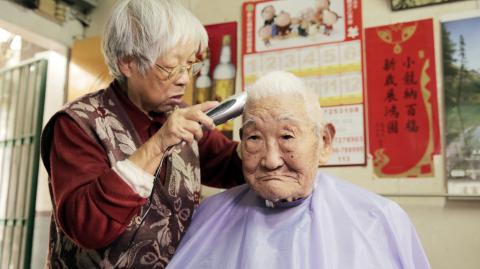Ways into Love (來得及說再見) is a work of socially-responsible filmmaking funded by President Chain Store (統一) with an aim to raise public awareness of issues surrounding the old, sick, isolated and poor.
The documentary is composed of three stylistically diverse shorts by filmmakers Singing Chen (陳芯宜), Shen Ko-shang (沈可尚) and Huang Chia-chun (黃嘉俊). Each tackles a different topic and is supported by one of the three participating welfare organizations: Mennonite Social Welfare Foundation (門諾基金會), Liver Disease Prevention and Treatment Research Foundation (肝病防治學術基金會) and Hondao Senior Citizens’ Welfare Foundation (弘道老人福利基金會).
In A Real Meal (好好吃飯), Chen’s modest and patient use of the camera introduces three elderly people who live alone and rely on services provided by volunteers from Mennonite, who deliver two meals a day to the old and the needy across Hualien. Chen subtly reveals the fear and longing of her subjects and shows how a simple act — opening a bag of rice — can be an insurmountable task.

Photo courtesy of Good Day Films
Tseng Yu-tsai (曾有財), an impoverished man living by himself, has returned to his dilapidated hut with the bag of rice he has just bought and tries to open it with a pair of rusted scissors. After many attempts he finally succeeds, only to realize that his rice cooker has broken. Two hours pass, and Tseng, who suffers from dementia, still hasn’t eaten.
Occasionally, the unexpected is caught on tape, such as a heart-wrenching moment in which Tseng suddenly turns to Chen behind the camera and says: “Nobody wants me. Who would?”
In terms of style, Murmuring Days (日日喃喃) is the most experimental among the three films. It follows three liver cancer patients, who face their sickness in different ways. Shen offers little exposition, allowing the viewer to work out what is happening on the screen.
A peculiar approach is adopted to contemplate how Hsu Ching-hsien (徐靜嫻), who suffers from stage-three cancer, and her husband Li Huai-chih (李懷之), view life in the face of death. The couple pour forth their private thoughts and deep emotions, sometimes with tears, sometimes with silence.
Shen’s admirably restrained lens eschews sentimentality. An expressive example can be found in a close-up of Liao Sheng-ming (廖盛銘), who attentively watches a video made for his young son. In mere seconds, the scene tenderly conveys the dying young father’s wish to remember and be remembered.
With When a Women Loves a Man (人之老), the last section of the triptych, Huang focuses on Guan Wen-yin (管文英) and Li Fu-tang (李福堂), a nonagenarian couple separated by the Chinese Civil War and reunited after nearly half a century. The resulting work is the most uplifting among the three, offering a heart-warming portrait of the couple taking care of each other at the twilight of life.
All net profits will be donated to the three above-mentioned welfare organizations.

Taiwan has next to no political engagement in Myanmar, either with the ruling military junta nor the dozens of armed groups who’ve in the last five years taken over around two-thirds of the nation’s territory in a sprawling, patchwork civil war. But early last month, the leader of one relatively minor Burmese revolutionary faction, General Nerdah Bomya, who is also an alleged war criminal, made a low key visit to Taipei, where he met with a member of President William Lai’s (賴清德) staff, a retired Taiwanese military official and several academics. “I feel like Taiwan is a good example of

March 2 to March 8 Gunfire rang out along the shore of the frontline island of Lieyu (烈嶼) on a foggy afternoon on March 7, 1987. By the time it was over, about 20 unarmed Vietnamese refugees — men, women, elderly and children — were dead. They were hastily buried, followed by decades of silence. Months later, opposition politicians and journalists tried to uncover what had happened, but conflicting accounts only deepened the confusion. One version suggested that government troops had mistakenly killed their own operatives attempting to return home from Vietnam. The military maintained that the

Before the last section of the round-the-island railway was electrified, one old blue train still chugged back and forth between Pingtung County’s Fangliao (枋寮) and Taitung (台東) stations once a day. It was so slow, was so hot (it had no air conditioning) and covered such a short distance, that the low fare still failed to attract many riders. This relic of the past was finally retired when the South Link Line was fully electrified on Dec. 23, 2020. A wave of nostalgia surrounded the termination of the Ordinary Train service, as these train carriages had been in use for decades

Lori Sepich smoked for years and sometimes skipped taking her blood pressure medicine. But she never thought she’d have a heart attack. The possibility “just wasn’t registering with me,” said the 64-year-old from Memphis, Tennessee, who suffered two of them 13 years apart. She’s far from alone. More than 60 million women in the US live with cardiovascular disease, which includes heart disease as well as stroke, heart failure and atrial fibrillation. And despite the myth that heart attacks mostly strike men, women are vulnerable too. Overall in the US, 1 in 5 women dies of cardiovascular disease each year, 37,000 of them